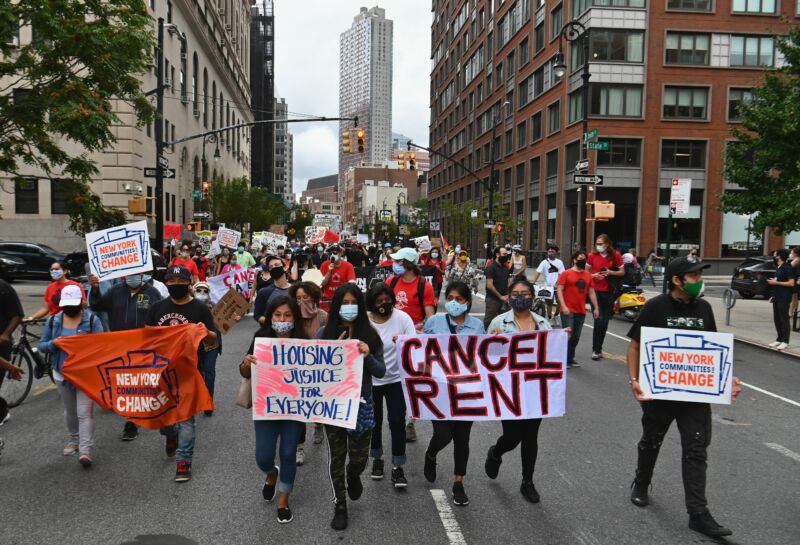
Citing the risks of COVID-19 spread, the Trump administration on Tuesday said it would halt US evictions through the end of the year, wielding a rarely used power of the Centers for Disease Control and Prevention.
Under the order, the CDC is halting residential evictions of people who are unable to pay full rent due to income loss and who expect to earn no more than $99,000 in income this year (or no more than $198,000 if filing a joint tax return). Renters hoping to be protected by the order must also certify, under penalty of perjury, that if they are evicted, they “would likely become homeless, need to move into a homeless shelter, or need to move into a new residence shared by other people who live in close quarters because [they] have no other available housing options.”
The order does not offer any financial relief—either for renters or for housing providers—and it doesn’t relieve anyone from having to pay their rent in full eventually. It also doesn’t prevent housing providers from charging interest or applying fees and penalties.
As such, the order has drawn mixed reactions from tenant and landlord advocacy groups, as renters may be safe for now but could face daunting back-rent later, while leaving small landlords potentially strapped for income.
The order also immediately drew questions about its legality. The order was issued under Section 361 of the Public Health Service Act (42 U.S. Code § 264), which authorizes the Surgeon General and Secretary of Health and Human Services “to make and enforce such regulations as in his judgment are necessary to prevent the introduction, transmission, or spread of communicable diseases from foreign countries into the States or possessions, or from one State or possession into any other State or possession” and to have the CDC carry out the regulations.
Unprecedented and historic
The order also references 42 CFR 70.2, which states that “whenever the Director of the Centers for Disease Control and Prevention determines that the measures taken by health authorities of any State or possession (including political subdivisions thereof) are insufficient to prevent the spread of any of the communicable diseases from such State or possession to any other State or possession, he/she may take such measures to prevent such spread of the diseases as he/she deems reasonably necessary.”
In the order, the CDC lays out all the risks that evictions pose for the spread of COVID-19, which largely transmits from close contact—plus all the benefits of having people stay in their homes.
“Eviction moratoria facilitate self-isolation by people who become ill or who are at risk for severe illness from COVID-19 due to an underlying medical condition,” the order notes. Eviction bans also make implementing stay-at-home orders easier for state and local authorities.
Perhaps most importantly, halting evictions will prevent people from moving into shared housing with family and friends, becoming homeless, and/or moving into shelters. Crowded housing conditions and moving in with relatives—who may be older and more at risk of severe COVID-19—can increase the risk of disease spread, the order notes. Homelessness, which often strikes those with underlying health conditions and/or older individuals, further puts people at risk of contracting COVID-19 and developing severe disease, particularly as fall and winter seasons approach.
“In short, evictions threaten to increase the spread of COVID-19 as they force people to move,” the order states.
With a note of self-awareness, the order recognizes several times that it is an extraordinary action. “COVID-19 presents a historic threat to public health,” it states. “To respond to this public health threat, the Federal, State, and local governments have taken unprecedented or exceedingly rare actions, including border closures, restrictions on travel, stay-at-home orders, mask requirements, and eviction moratoria.”
reader comments
400